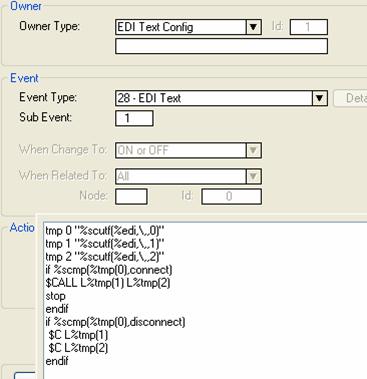Difference between revisions of "External Data Input"
From Zenitel Wiki
| Line 6: | Line 6: | ||
|- | |- | ||
! align="left"|[[Event Handler#Events Types - Grouped by Function|Event type]]: | ! align="left"|[[Event Handler#Events Types - Grouped by Function|Event type]]: | ||
| − | | External Data Input | + | | 28 - External Data Input |
|- | |- | ||
! align="left"|[[Sub-Event (Event Handler)|Sub-Event]]: | ! align="left"|[[Sub-Event (Event Handler)|Sub-Event]]: | ||
Revision as of 17:04, 31 August 2007
Event description
| Event Owner: | EDI Text Config |
|---|---|
| Event type: | 28 - External Data Input |
| Sub-Event: | 1 – 4: specifies which EDI port. 0: matches all ports |
| When Change to ON: | When valid data is received on EDI port |
| When Change to OFF: | N/A |
| When Related to: | N/A |
- Input message
- - The EDI port is defined in the ‘Serial Ports’ Setup
- - The input message must have a termination character. Max 128 char.
- - Parsing the content is done in the action string
- Context parameters
- Useful macros and statements
Example
The rule below will allow you to issue commands to EDI port like this:
- connect,101,103
- -Generates internal command $CALL L101 L103
- disconnect,101,103
- -Generates internal commands $C L101and $C L103
evh add edi 0 tmp 0 "%scutf(%edi,\,,0)" tmp 1 "%scutf(%edi,\,,1)" tmp 2 "%scutf(%edi,\,,2)" if %scmp(%tmp(0),connect) $call l%tmp(1) l%tmp(2) stop endif if %scmp(%tmp(0),disconnect) $c l%tmp(1) $c l%tmp(2) stop endif

